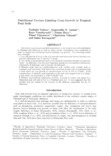Nutritional Factors Limiting Crop Growth in Tropical Peat Soils
Tropical agriculture research series : proceedings of a symposium on tropical agriculture researches
| ISSN | 03889386 |
|---|---|
| NII recode ID (NCID) | AA00870529 |

Full text
tars24-_146-156.pdf2.09 MB
Soil culture experiments and field experiments on the tropical peat soils distributed in Thailand and Malaysia as well as water culture experiments were conducted in order to analyze the nutritional factors limiting crop growth. The following results were obtained.
1) Low pH and low K level of the soil were the most important factors limiting crop growth, followed by low P and low N levels.
2) Low levels of micronutrients such as Cu, B and Zn sometimes became an important factor. Cu deficiency was the most important among the micronutrient deficiencies, followed by B deficiency and eventually Zn deficiency.
3) Phenolic acids such as p-hydroxybenzoic acid, vanillic acid, syringic acid, p-coumaric acid and ferulic acid which were contained in peat soils as monomers had a toxic effect on crop growth at concentrations as low as 0.05 to 0.2mM. Total concentration of phenolic acid monomers in the peat soils ranged from 4 to 134μg/g soil which was equivalent to 0.005-0.19mM/l soil.
4) Without micronutrient application, sterility occurred in tomato and maize in a Malaysian peat soil and in rice in a Thailand peat soil. It was suggested that the sterility was not caused by the toxicity of the phenolic compounds, but by Cu deficiency.
1) Low pH and low K level of the soil were the most important factors limiting crop growth, followed by low P and low N levels.
2) Low levels of micronutrients such as Cu, B and Zn sometimes became an important factor. Cu deficiency was the most important among the micronutrient deficiencies, followed by B deficiency and eventually Zn deficiency.
3) Phenolic acids such as p-hydroxybenzoic acid, vanillic acid, syringic acid, p-coumaric acid and ferulic acid which were contained in peat soils as monomers had a toxic effect on crop growth at concentrations as low as 0.05 to 0.2mM. Total concentration of phenolic acid monomers in the peat soils ranged from 4 to 134μg/g soil which was equivalent to 0.005-0.19mM/l soil.
4) Without micronutrient application, sterility occurred in tomato and maize in a Malaysian peat soil and in rice in a Thailand peat soil. It was suggested that the sterility was not caused by the toxicity of the phenolic compounds, but by Cu deficiency.
| Date of issued | |
|---|---|
| Creator | Toshiaki Tadano Kamarudin B. Ambak Koyo Yonebayashi Tetsuo Hara Pissot Vijarnsorn Chairatna Nilnond Sadao Kawaguchi |
| Publisher | Japan International Research Center for Agricultural Sciences |
| Volume | 24 |
| spage | 146 |
| epage | 156 |
| Language | eng |
